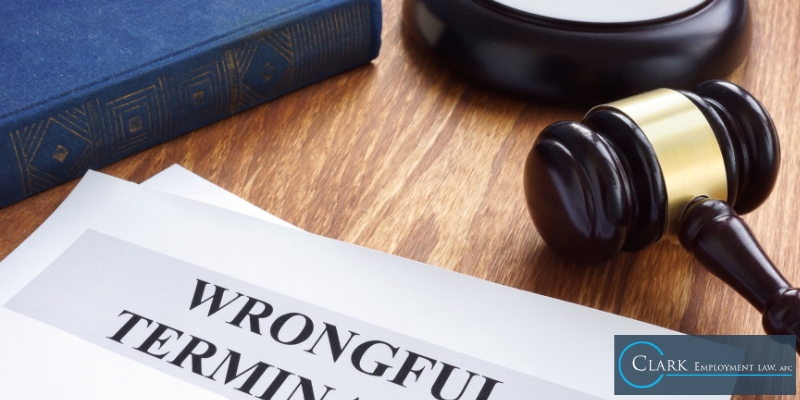Los Angeles Wrongful Termination Lawyer
Los Angeles Wrongful Termination Attorney

Millions of Americans rely on their jobs to provide for their families. Every American worker has the right to expect a workplace free of discrimination, harassment, retaliation, and unreasonable health or safety issues. Unfortunately, many employees are subjected to adverse conditions in their workplaces and penalized when they attempt to speak up about their concerns or assert their legal rights. If you have recently lost your job and believe it qualifies as wrongful termination, you need to speak with our Los Angeles wrongful termination lawyer as soon as possible.
Representing Wrongfully Terminated Los Angeles, CA, Employees
Clark Employment Law, APC, can provide the legal counsel you need when you have been wrongfully terminated. It’s vital to know the definition of wrongful termination and how to prove wrongful termination has occurred in an at-will employment state like California. Our team will carefully review your situation and help you determine the best available legal remedies if your employer illegally fired you in response to a protected activity or for a discriminatory or retaliatory reason.
Why Do I Need a Los Angeles Wrongful Termination Lawyer?
If you have experienced wrongful termination, it’s natural to feel powerless and hopeless about your situation. Losing your job in response to a legally protected action or due to illegal discrimination is incredibly demoralizing, and California’s at-will employment statute may make it seem as though an employer can simply fire you for any reason or no reason at all.
The reality is that California’s at-will law means that an employer or employee can terminate a working relationship at any time, with or without notice and with or without listing a specific cause. Still, the at-will law does not permit an employer to fire an employee for a discriminatory, retaliatory, or otherwise illegal reason.
Navigating a wrongful termination claim is incredibly difficult, especially when the employee struggles with the personal and professional consequences of losing their job. Hiring experienced legal counsel from a reputable Los Angeles wrongful termination attorney is one of the best things anyone can do in this situation.
Our legal team will carefully review all your employment contracts and documentation to determine whether California’s at-will statute applies to your situation, and even if it does, you may still have grounds for a wrongful termination claim due to your employer’s behavior leading up to your termination.

What Is a Wrongful Termination?
The term “wrongful termination” refers to an illegal firing of an employee. Employers generally have the right to hire and fire employees at their discretion, but they cannot be discriminatory in any way in these decisions. There are generally four ways for wrongful termination to occur:
1. An employee is fired in a way that breaches a standing employment contract. Employees with legally enforceable contracts are typically exempt from at-will employment statutes, and their employers must meet specific criteria to fire them. Typically, the employer must have already issued several preliminary warnings or disciplinary actions, or the employee must have violated the terms of their own contract for a termination to be legitimate.
2. An employer violates their own company policies in conducting a termination. If the employer upholds a termination policy and violates their policy in any way, this can constitute wrongful termination in California.
3. An employer fired an employee in response to the employee’s legally protected action, such as blowing the whistle or threatening to blow the whistle on illegal acts or unsafe practices, testifying under oath in a court case involving the employer, requesting for reasonable accommodation, taking protected medical family leaves, or filing a whistleblower complaint against the employer.
4. An employer terminates an employee for a discriminatory reason. Employers may not fire an employee because of the employee’s race, color, religion, sex, gender, gender identity, gender expression, sexual orientation, marital status, national origin, ancestry, mental and physical disability, medical condition, age, pregnancy, or any other protected characteristic(s).
A Los Angeles wrongful termination attorney is your best available resource if you believe your recent termination was wrongful in any way. Clark Employment Law, APC, will carefully review the details of your recent firing and analyze any evidence you can provide that might prove a discriminatory, retaliatory, or illegal action from your employer.
What Might the Defendant Argue?
Wrongful termination claims are serious matters, and most defendants will put up a strong defense. California is an at-will employment state. This allows managers and supervisors to fire an employee for any number of reasons or no reason at all. If you were wrongfully terminated, your Los Angeles wrongful termination lawyer will collect evidence to prove that you were fired in violation of a contract or law.
Your former boss will likely hire an attorney or use in-house legal resources to defend themselves. Opposing counsel may try to gather documents that show the business owner or manager had a valid reason for terminating you from her former position. One common defense is arguing that you did not meet work-related expectations.
Our attorneys can gather documentation and interview former co-workers to rebut any accusations that the termination was well founded. Basing your case on clear evidence is key because some individuals make false claims about wrongful termination.
Any settlement or jury trial must be based on evidence and testimony. Often, some of the strongest evidence to support your claims comes from your former co-workers who worked alongside you for months or years. Ultimately, any attempt to discredit your reputation may backfire as the facts of the case are made clear.
Most companies have clear steps and policies in place that govern how employees are disciplined and notified of issues before termination is considered. If your former boss failed to follow these steps, it could bolster your case and improve the chances that you are awarded a favorable settlement or monetary damages.
The attorneys of Clark Employment Law, APC, have handled many wrongful termination cases, and our lawyers have successfully rebutted a range of tactics from defendants. When the truth is on your side, working with an experienced lawyer can lead to favorable outcomes.
What Are Potential Favorable Outcomes in Wrongful Termination Claims?
With a strong legal team behind you, one favorable outcome is a settlement agreement. Once your claim is filed and opposing counsel is served notice of the civil litigation, your attorneys will begin collecting evidence. As our lawyers learn about your case, we will be communicating with the opposing counsel.
Our goal is to find timely and robust compensation for your wrongful termination. At any point during your case, opposing counsel may make a settlement offer. A settlement allows both parties to close the case and avoid mounting legal bills for both parties. Settlements also allow defendants to manage risk because jury trials could potentially award hundreds of thousands of dollars or more.
If opposing counsel makes a settlement offer, our attorney will describe the pros and cons of accepting that offer. Settlement offers provide relief for people who were wrongfully fired. As a condition of the settlement, the defendant may or may not accept responsibility for wrongdoing. Many business owners are inclined to settle to avoid embarrassing details of their workplaces being revealed in a public setting.
If both parties do not agree to settlement terms or if no settlement offer is made, the case will proceed to trial, where a jury will decide how much and what kind of damages are awarded to the defendant. A jury may decide to award no damages, a modest amount, or a high amount to the plaintiff at the conclusion of the trial. Whether the case is closed through a settlement or jury trial, plaintiffs have the option of seeking monetary damages or even reinstatement at their former place of work.
Examples of Whistleblower Retaliation
OSHA laws prohibit employers from retaliating against any worker for engaging in protected activities. Whistleblower retaliation can take the form of adverse actions that result in a negative impact on an employee’s morale. Courts recognize actions that are easy to recognize and not subtle. Examples of adverse actions that can make an employer liable for civil action include:
- Demotion
- Denying a promotion
- Denying overtime
- Failing to rehire
- Intimidation
- Harassment
- Reassignments to less desirable positions
- Reducing hours or hourly pay
- Blacklisting
- Reporting an employee to immigration authorities
One example of whistleblower retaliation could be the termination of an employee who reported unsafe working conditions to OSHA. Often, workers try to report dangers to fellow employees or supervisors only to have those warnings ignored. If the worker reported the unsafe conditions to government authorities and was demoted, fired, or harassed for those actions, then the terminated employee may have legal grounds for suing their former employer.

FAQs
Q: What Qualifies as Wrongful Termination in California?
A: Wrongful termination occurs when a worker is fired unlawfully. The wrongful termination could violate company policy, a contractual agreement, or a local, state, or federal law. There are many protections in place for workers with protected characteristics that include race, age, and sexual orientation. These cases are complicated and require insight from experienced attorneys who handle wrongful termination cases.
Q: What Is the Average Settlement for Wrongful Termination in California?
A: Settlement offers are based on several factors and can range from a few thousand dollars to tens of thousands or more. The primary factor involves how egregious the termination was. The value of the position lost is another factor. While some terminations may be defendable in a court of law, many cases involve clear violations of contractual agreements and laws.
Q: What Is the Burden of Proof for Wrongful Termination in California?
A: The burden of proof typically falls on the plaintiff, whose attorney gathers evidence to make legal arguments that the defendant breached a contract or violated a law governing how employees can be terminated. Civil cases require a preponderance of evidence to prove a case in favor of the plaintiff. In simple terms, this means that the plaintiff and their lawyer must prove that the evidence shows that it is more likely than not that the plaintiff was wrongfully terminated.
Q: How Do You Argue Wrongful Termination?
A: Any motions and legal arguments must be based on laws and contract agreements. There are state and federal laws that govern how employees can be lawfully terminated. If an employer’s contract with the employee states that workers have 30 days of vacation time, for example, that employer cannot fire the worker for taking 30 days or less of vacation time. Employees cannot be terminated due to their gender, race, sexual orientation, or other protected characteristic.
What to Expect From Your Los Angeles Wrongful Termination Attorney
A successful wrongful termination claim can potentially yield substantial compensation for the plaintiff. For example, if you were illegally fired from your job, your attorney could help you hold your employer accountable for your lost income, lost benefits, and other economic damages resulting from their actions.
It is also likely that you will be able to recover compensation for your emotional and mental distress inflicted by your employer’s wrongful action. If you desire reinstatement, your attorney may be able to assist with this as well.
If you are a wrongful termination victim, you have rights. The team at Clark Employment Law, APC, understands the significant toll a wrongful termination can take on you and your family. We are committed to seeking justice for employees who have been wrongfully terminated.
If you believe you were wrongfully terminated from your job, our firm will help you approach your case with confidence. If you are ready to discuss your legal options with an experienced Los Angeles wrongful termination attorney, contact us today at (818) 741-2101 to schedule a free consultation with our team.


